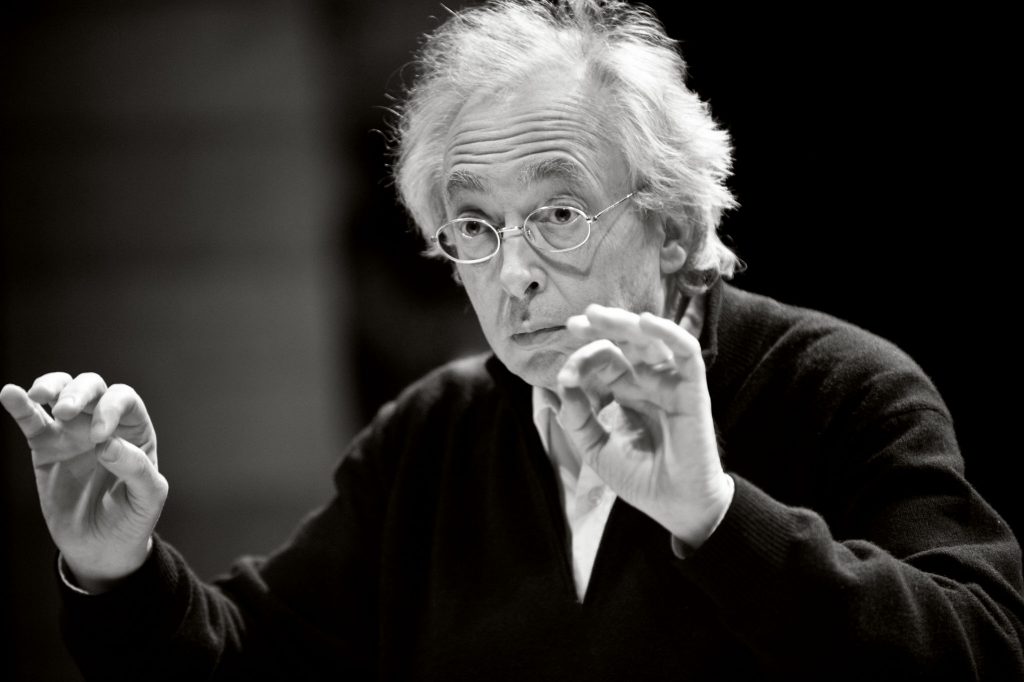by Jarrett Hoffman
Philippe Herreweghe’s musical career began with a focus on Renaissance music and Bach. Later he explored the French Baroque. Still musically curious, he began to examine the Classical and Romantic eras through the lens of period instruments.
More recently, Herreweghe has been brought in regularly by modern orchestras, like the Amsterdam Concertgebouw, to conduct Romantic music in a “new” way — one informed by his experience in early music and historical performance.
One of the latest such invitations has come from The Cleveland Orchestra, with whom the Belgian conductor will make his debut this week. His program at Severance Hall includes Mozart’s “Jupiter” Symphony and two works by Beethoven: the Overture to Egmont and the Violin Concerto, featuring Isabelle Faust as soloist.
Performances take place Thursday, February 13 at 7:30 pm, Friday the 14th at 7:00 pm (no concerto — or intermission — as part of the Fridays@7 program), Saturday the 15th at 8:00 pm, and Sunday the 16th at 3:00 pm.
While Herreweghe is a strong believer in historical instruments, more important to him is a sense of historical style. “In the beginning of the 20th century or so, there was a kind of divorce between singing and playing an instrument,” he said during a recent telephone call. Until that point, he explained, musicians were singers and players. “All music was based on singing. And singing also means text, so music was articulated and organized in a process that is very close to speaking.”
Herreweghe is fond of that rhetorical approach to music. “I am not at all pretentious — I don’t say that what I do is the truth or the best way. But at least, I think, it’s an interesting way to approach music.”
Some conductors who bring a background in early music to their appearance with a modern orchestra choose to scale down the size of the ensemble. For Herreweghe, that’s not at all an automatic decision. On one hand, large forces can “kill” a Bach cantata, he said. And in the case of Mozart, Herreweghe noted that the composer often performed his symphonies with small ensembles. But that wasn’t always the case.
“Paris, in the time of Mozart and Beethoven, had the best orchestras, and they weren’t especially small — they already had ten or even twelve first violins.”
Other composers present options as well. “In my opinion, you can perform an oratorio of Handel with 20 people, but also with 200 and it can be convincing. Also Brahms — he liked to have his symphonies performed by very small orchestras, with eight first violins, but sometimes there were 24. So the number should be linked to the concert hall where you play.”
Moving on from discussing style, Herreweghe and I also delved into his musical beginnings in his native Ghent, which included experience won the podium from an early age: he attended Sint-Barbaracollege, a private Jesuit school, and conducted the choir from the age of 14. “We sang music by Palestrina, Schütz, a little bit of Bach, and so on,” he said.
That music became so important to Herreweghe that he began to imagine a future where he would be an amateur conductor of early music in addition to pursuing his “normal” profession. “I speak now about the ‘70s in Europe, when the ancient music movement didn’t yet exist.”
That normal profession, according to his plans, would be in medicine and psychiatry, fields he studied at the University of Ghent for eleven years. “But during those studies, in fact, I conducted more and more.”
There he founded the Collegium Vocale Gent, which lives on to this day. “It’s a kind of choir and orchestra that in the beginning was mainly dedicated to Bach,” he said. “And a very important thing happened in my life around age 22: I met Nikolaus Harnoncourt and Gustav Leonhardt. They heard my ensemble — my little orchestra and choir — and invited me to record all the Bach cantatas with them for Telefunken.”
That led to “a kind of schizophrenic situation in that period of my life,” Herreweghe said. “During the day I was in hospital to study psychiatry, and in the evening in Amsterdam — which is not far, maybe 250 miles — I conducted a fantastic orchestra with Gustav Leonhardt himself playing the harpsichord, and with Anner Bylsma and Frans Brüggen.”
After eleven years in school, Herreweghe never did practice medicine but instead entered into the life of a professional musician. “My group Collegium Vocale soon toured all over the world, especially in Europe, and I decided only to do that. I dedicated my life in the beginning to that ensemble and mainly to the music of the 18th century.”
Herreweghe gradually expanded his horizons by founding new orchestras. La Chapelle Royale focused on French Baroque music, while the Orchestre des Champs Élysées pushed forward into Classical and Romantic music, but with period instruments.
The conductor reflected on how much has changed since the beginnings of the period-instrument movement. “When we first played the music of Bach on historical instruments, people found that stupid. They said that the piano is simply better than the harpsichord, and that the modern flute is better than the wooden flute of the Baroque, and so on. But now in Europe, what we call modern orchestras don’t even dare to play Bach anymore, which is also a little bit of a pity.”
Published on ClevelandClassical.com February 10, 2019.
Click here for a printable copy of this article



